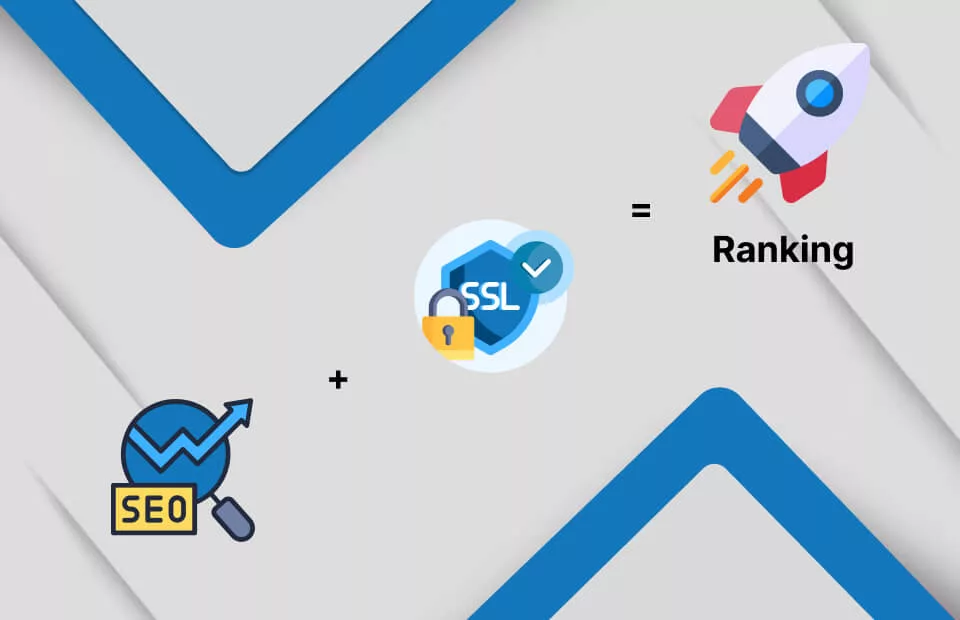SSL Certificate: Must-Have Security Measure for Website’s SEO and Reputation

Why are SSL Certificates Essential for Website Security and SEO?
Whether you’re running an e-commerce website, a blog, or any other type of online platform, equipping it with the necessary security mechanism is of utmost importance. One aspect of security is the application or SSL certificate – a security component essential for both website security and SEO purposes. Not only will it help protect your site from potential threats, but it will also improve your search engine rankings and ultimately lead to a better user experience for your visitors.
Before knowing its importance, let us have a look at how it helps in website security.
How does SSL Certificate Protect Websites?
SSL stands for Secure Sockets Layer, a security protocol used to encrypt and secure the communication between web server & user’s web browser. Simply, SSL/TLS certificate creates an encrypted connection between a website and its users, ensuring that all data and information exchanged between them is private & secure.
When a user visits a website with an SSL certificate, the web server sends a digital certificate to user’s web browser to authenticate the website’s identity & establishes a secure connection. This secure connection assure all data/information exchanged between website and users is private.
What is the Importance of SSL on Your Website?
Picture this: you’re about to make an online purchase, and the website asks for your credit card information. You fill in your details, click the ‘Submit’ button, and…wait. What happens to your information once you hit that button?
Unfortunately, in today’s world, your sensitive information is at risk as cybercriminals can steal your personal details, like your credit card or bank account details, and use them to make unauthorized purchases. This is where SSL comes in.
SSL (Secure Sockets Layer) is a type of security technology that encrypts your connection with the website you’re visiting. It creates a secure communication channel between you and the website that keeps your information secure. Hence, If attackers try to steal your information, they won’t be able to access it because of the encryption mechanism.
So how do users know if a particular website is safe or not?
How to Know if a Website is Safe or Not?
SSL Certificate (HTTPS) indicates whether a website is secure enough to share sensitive information and helps users identify websites with SSL instantly. Leading the charge is Google Chrome, which provides visible indicators when a website has an SSL certificate.
One way to know if a website has an SSL certificate is by checking the URL. Websites with SSL have URLs that start with ‘https://’ instead of ‘http://.’ The extra ‘S’ indicates that the website is secure. Additionally, there will be a padlock icon in the URL bar or an explicit message stating that the website is ‘Secure.’
By clicking on the padlock icon, users can access more details about the website & the CA (Certificate Authority) that has issued the SSL. Hence, users can verify that website is genuine & secure and they can enter their sensitive information without any fear.
SSL doesn’t just protect your personal information from hackers; It also helps boost your website’s reputation as well as SEO rankings. Search engines like Google prioritize secure websites over non-secure ones, so having an SSL certificate can improve your website’s SEO Performance. To understand it better, let’s get into understanding SEO.
What is SEO?
SEO is the practice of optimizing a website to improve its visibility & ranking in search engine result pages. Its goal is to increase the quantity and quality of organic traffic for website from search engines like Google, Bing, and Yahoo.
SEO involves a range of techniques & strategies used to improve various aspects of a website, including its content, design, development, scripting, and also the performance. By optimizing a website for Search Engines, the owner can attract more visitors to their site, increase brand awareness, and generate more leads & sales. It is an ongoing process that requires continuous monitoring, analysis, and optimization to achieve and maintain high search engine rankings.
In terms of SEO, SSL plays a crucial role in determining the ranking of a website on search engine result pages. Let’s find out now.
How Does SSL Help in Website’s SEO Ranking?
Google prioritizes HTTPS based websites on its organic search results. This implies that security-conscious users tend to look for websites that provide a secure browsing experience when seeking information or shopping online.
1. SSL as a Gatekeeper
Think of SSL as a gatekeeper for your website, standing at the entrance to ensure only safe & trustworthy visitors are granted access.
Just like how Google is the gatekeeper of websites, determining which websites are worthy of ranking higher in search results, it also made it clear that SSL certification is a ranking factor. In fact, it actively encourages website owners to switch from HTTP to HTTPS to keep everyone safe on the web.
While high-quality content is still given more weight in Google’s ranking algorithm, having SSL installed on your website can give you a leg up in the search engine rankings. Google has even tested the HTTPS signal & found it to have positive results both in terms of ranking and relevance.
By securing your website with SSL, you’re essentially proving to Google that you’re a safe and trustworthy source, just like how visitors are proving to your website’s gatekeeper that they’re safe and trustworthy visitors. So, make sure you have an SSL certificate installed to keep your website safe and to improve your SEO ranking.
2. A Secure Connection = Low Bounce Rates = Higher SEO
Another way it can benefit your website is by reducing your bounce rate. This encrypted connection provides an extra layer of security and visitors can feel more confident & protected while using the site. As a result, visitors are more likely to engage with the site, explore its content, and ultimately stay longer, resulting in lower bounce rates.
If a website does not have SSL, visitors may receive a warning message in browser, indicating that the site is not secure. This can cause visitors to become suspicious or concerned about the safety of the site and lead them to leave the website quickly, resulting in a high bounce rate.
Google takes note of this increased engagement & rewards your site with better SEO rankings. A low bounce rate can signal to search engines that visitors are engaging with the website and finding it helpful, which can positively impact its ranking.
But that’s not all SSL can do for your website’s SEO. There’s more.
3. Trusted Connection = Less Competition = Stronger SEO
Having an SSL certificate can also give your website an advantage in terms of competition. Since not all websites have implemented SSL Encryption, having it can set your website from those that haven’t, making it stand out in SERPs and lead to a higher click-through rate (CTR) and, ultimately, more traffic to your site.
By providing a secure environment for your users to interact with your site, you can give yourself a competitive advantage & build a stronger relationship with your customers.
So now we know SSL’s benefits, which one to get? We have got you covered on that front as well.
SSL Certificate Types and Installation
There are different types of SSL certificates available, depending on the level of validation required and the number of domains/sub-domains user wishes to secure.
Here are the three types of SSL certificates:
Domain Validation (DV) SSL Certificate
A Domain Validated SSL certificate is the most basic type of SSL certificate. The Certificate Authority (CA) only verifies the domain ownership before issuing the certificate. Since it is relatively cheap & easy to obtain, it is ideal for small websites or blogs that do not handle sensitive information.
Organization Validation (OV) SSL Certificate
For OV SSL, the CA verifies the domain ownership & organization’s identity before issuing the certificate. Thus, it is used by websites of businesses/organizations that handle sensitive information like credit card details or personal information. Here, Users can see the organization’s name in the web browser to make them understand the website is legitimate.
Extended Validation (EV) SSL Certificate
An Extended Validation SSL Certificate is the highest level of SSL certificate and provides the most holistic validation process. To obtain this, the applicant has to go through the strict verification of domain ownership and legal existence by the Certificate Authority.
Steps to Install an SSL Certificate
These are the four steps involved in installing an SSL certificate.
Step-1: Choosing a Certificate Authority (CA)
A CA is a third-party entity that verifies the identity of the website & issues the SSL certificate. It is crucial to choose a reputable CA to ensure the certificate’s legitimacy and avoid any potential security risks.
Certera, Sectigo, and Comodo are considered as the most trusted and highly adopted Certificate Authorities offering SSL Certificates for public domains.
Step-2: Generating a Certificate Signing Request (CSR)
CSR contains information about the website, including the domain name, organization name, key algorithm, size and more. It is used by the CA to verify the website’s identity before issuing the SSL certificate.
The CSR can be generated using the free CSR Generator tool.
Step-3: Installing the SSL Certificate
After receiving the SSL certificate from the CA, the next step is to install it on the web server. The installation process varies depending on the web server but typically involves copying and pasting the SSL certificate and private key into the server’s control panel. The web server will then bind the SSL certificate to the domain name and enable HTTPS on the website.
Step-4: Testing the SSL Certificate
The testing of SSL installation can be done by accessing the website using HTTPS and checking the padlock icon in the web browser’s URL bar. The padlock icon indicates that the website is secured with SSL encryption and the certificate is valid. One can also use online SSL Checker Tool to verify the SSL certificate’s installation and configuration.
Following these steps ensures that the SSL certificate is correctly installed, providing secure and encrypted communication between the website and the user’s web browser.
Ending Words
As browsers continue to crack down on unsafe sites, having an SSL certificate is becoming increasingly important. Also, if you want your website to appear at the top of the search engine result page, you better tighten up your website security because Google considers multiple factors before ranking websites. And guess what? Website security is one of the most crucial factors that can make or break your SEO ranking.
Google is smart, & it won’t let manipulative websites slide through its search results. So, don’t be left in the dust – upgrade your website’s security and protect your users’ sensitive information. With SSL-enabled sites as the future of internet browsing, there’s no time like the present to make the switch. Embrace the future of online security and join the SSL revolution today.
